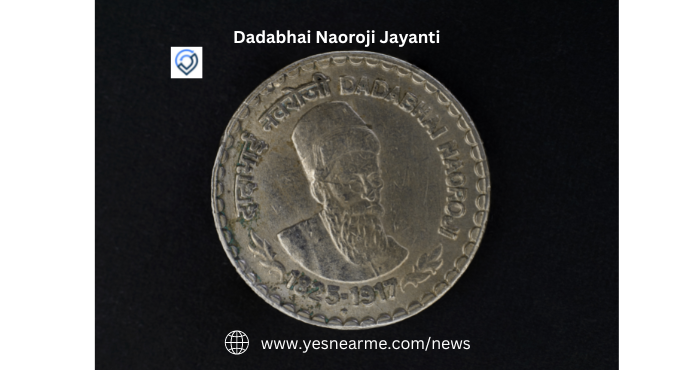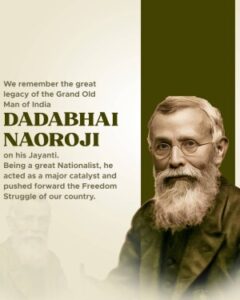
‘ ); } ?>
Table of Contents
Dadabhai Naoroji Jayanti: A Tribute to the Grand Old Man of India
Introduction
Dadabhai Naoroji Jayanti is celebrated annually to honor the birth anniversary of Dadabhai Naoroji, a towering figure in India’s struggle for independence. Known as the Grand Old Man of India, Naoroji was a pioneering nationalist leader, social reformer, educationist, and economic thinker. His contributions to India’s freedom movement and his advocacy for self-governance made him a revered figure in the country’s history.
The Dadabhai Naoroji Jayanti serves as a significant occasion to remember his invaluable efforts, particularly his role in exposing the economic exploitation of India under British colonial rule and laying the foundation for the Indian National Congress (INC). This day is marked with commemorative events, speeches, and programs to inspire the younger generations by remembering his legacy.

Early Life and Background
Dadabhai Naoroji was born on 4 September 1825 in Navsari, a small town in present-day Gujarat, India, into a Parsi Zoroastrian family. His father, Naoroji Palanji Dordi, passed away when he was young, leaving his mother, Manekbai, to raise him. Despite financial struggles, Naoroji’s mother ensured he received a quality education, recognizing his exceptional intelligence.
He attended the Elphinstone Institution (now Elphinstone College) in Bombay (now Mumbai), where he exhibited outstanding academic performance. His brilliance earned him a professorship in mathematics and natural philosophy at the same institution, making him the first Indian to hold such a prestigious academic post.
Political Career and Nationalism
Naoroji’s entry into politics marked the beginning of a new era in India’s struggle for independence. His political career can be divided into the following key phases:

1. Founding the Indian National Congress
Naoroji played a vital role in establishing the Indian National Congress (INC) in 1885, alongside A.O. Hume and Dinshaw Wacha. The INC became a crucial platform for voicing the demands of Indians and challenging British policies. Naoroji’s influence on the INC was profound, and he became its president three times—in 1886, 1893, and 1906.
2. The Drain of Wealth Theory
One of Naoroji’s most significant contributions was his Drain of Wealth theory, which he outlined in his seminal book, Poverty and Un-British Rule in India (1901). He argued that Britain was systematically draining India’s wealth by:
- Unfair taxation and trade policies.
- Export of Indian resources without fair compensation.
- The repatriation of salaries earned by British officials working in India.
- The exploitation of Indian labor without equitable remuneration.
His theory became the cornerstone of the economic critique against British colonial rule and inspired many future leaders, including Mahatma Gandhi and Bal Gangadhar Tilak.

3. First Indian Member of the British Parliament
In 1892, Naoroji made history by becoming the first Indian Member of Parliament (MP) in the British House of Commons. Representing the Liberal Party, he won the Finsbury Central constituency in London. During his term, he relentlessly advocated for Indian rights and sought political reforms, raising issues related to poverty, discrimination, and self-governance.
4. Advocacy for Swaraj
Naoroji was one of the early proponents of Swaraj (self-rule). During his presidential address at the 1906 INC session, he declared self-government as the ultimate goal of the freedom movement. This call for Swaraj became a guiding principle for the subsequent independence struggle.
Contributions to Social and Educational Reforms
Apart from his political endeavors, Naoroji made significant contributions to social reform and education. His efforts included:
- Promotion of women’s education: Naoroji was a strong advocate for women’s rights and their access to education.
- Parsi social reforms: As a Parsi, he worked to reform social practices within the community, emphasizing the importance of modern education and gender equality.
- Founding educational institutions: He co-founded the Gyan Prasarak Mandali, an educational society aimed at promoting literacy and learning among Indians.
- Advocacy for civil rights: Naoroji worked tirelessly to promote civil liberties and fair treatment of Indians in both India and Britain.
Legacy and Influence
The legacy of Dadabhai Naoroji extends far beyond his lifetime. His contributions laid the intellectual foundation for the Indian independence movement. His insistence on exposing British economic exploitation awakened national consciousness and inspired future leaders.
1. Influence on Gandhi and Other Leaders
Naoroji’s ideas greatly influenced Mahatma Gandhi, who referred to him as a mentor. Gandhi adopted Naoroji’s economic critique in his own campaigns against British rule. Other leaders, such as Gopal Krishna Gokhale and Bal Gangadhar Tilak, were also inspired by Naoroji’s vision of self-rule.

2. Impact on Economic Nationalism
Naoroji’s Drain of Wealth theory was a critical economic analysis that fueled the rise of economic nationalism. It encouraged Indians to challenge British economic policies and laid the groundwork for the Swadeshi Movement, promoting the use of Indian-made products.
Dadabhai Naoroji Jayanti Celebrations
The Dadabhai Naoroji Jayanti is celebrated every year on 4th September, the day of his birth. The celebrations often include:
- Lectures and seminars highlighting his contributions to India’s freedom movement.
- Tributes and cultural programs showcasing his life and works.
- Educational events in schools and colleges to spread awareness about his role in India’s history.
- Wreath-laying ceremonies at his statues and memorials across the country.
Conclusion
Dadabhai Naoroji Jayanti is not merely a celebration of his birth anniversary but a tribute to his enduring legacy. His economic theories, political activism, and social reform initiatives shaped the course of India’s struggle for independence. As the Grand Old Man of India, Naoroji’s life continues to inspire generations, reminding them of the importance of courage, perseverance, and unwavering commitment to justice.
By remembering Naoroji on his Jayanti, we honor a visionary leader whose efforts laid the foundation for India’s eventual freedom and whose economic insights remain relevant in contemporary discussions on colonialism, economic justice, and self-governanc
Famous Places To Visit In Agra
FOR MORE INFO
